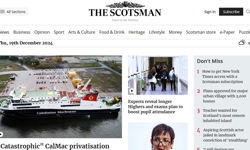In the last ten years, there has been precious little good news about the regional and local newspaper industry. True, in the mid 2000s there was still plenty of acquisition activity; share prices of the quoted businesses were still riding high; margins were bordering on the ridiculous (if not the immoral); and morale amongst the troops was pretty good. But it wouldn’t have taken much digging below the surface to discover that it was all one huge bubble waiting to burst.
Sadly that digging never took place. Either ostriches or blind eyes, or both, were employed by all manner of people so that, when the bubble did pop, the crying of foul and the denial of responsibility took centre stage while leaving one almighty mess.
This has resulted in jobs going, titles closing, retrenchment being the main order of the day / month / year – and most commentators writing off the sector like some old dairy cow being sent off to the knackers’ yard. Nice when it was around, but not quite the right thing for the 21st century, old boy.
But after the deluge of bad news over such a long period, last November saw the first sighting of what may be a new dawn for the industry. Not a definite will, but a possible may.
(Pictured above: David Montgomery, on the left, and Steve Auckland.)
Negative reaction
Sadly, the announcement that David Montgomery was establishing Local World as a business venture to take over the assets of Northcliffe Media and Iliffe News and Media was treated with scorn and disdain by those working in the business.
Those who pass comment on HoldTheFrontPage, the website that services the regional and local sector, are never the most cheery, perhaps understandably so, but their greeting of the Monty news was miserable in the extreme – despite this news arguably being the most encouraging and stimulating to hit the sector for, well, ten years.
Many will argue that David Montgomery is on trial. Can he make it work or will he just cut costs even more, as critics claim he will, and then make his money and clear off. Or will he try to be as radical as he claims he will be – and as the industry so desperately needs?
That he is on trial in the eyes of many, there is no doubt. But others are on trial, too. The government, through its agents on Earth – the Competition Commission and the Office of Fair Trading OFT) – must be proactive; those who work in the new company must try to see the opportunities; and those in other businesses in the sector that look on from the outside with fear and foreboding. But more of this later.
First, the industry needs David Montgomery, in his role as Local World chairman, and his chief executive Steve Auckland to bring new meaning to innovation and risk-taking – two factors that have never been totally evident in the long history of regional and local newspapers. They have an opportunity to show others what might have been.
And they have to be flag-bearers for an industry that has been a model, in a gross generalisation, of conservatism over most of its lifetime, apart from the few years from the late 1980s when it re-equipped pretty quickly in the wake of the craft unions’ collective demise and for the years following, until the mid 2000s, when it became expert in the art of making serious money.
Second, what actually is Local World and what is it attempting to be?
Montgomery was nothing but ambitious in his opening salvo, when he made his initial announcement back in November. His main statement is worth repeating as it was quite unlike anything witnessed in this sector in recent years. And it will either come back to haunt him – or it will prove to be a remarkable legacy of foresight.
A new type of media business
He said: “This is an entirely new type of media business. The value of Local World will lie in its people, its franchises and its IP. It will be unencumbered by the infrastructure of the industrial past such as property, printing presses and large-scale distribution or any legacy issues such as high levels of debt. Local World signals the fight back in Britain’s regional media industry.”
And he was right. Local World is a new type of media business – though it is one that others have been evolving towards becoming in recent years. And he had found the correct two partners in Northcliffe and Iliffe through which to launch it.
Of all the main established major players, Northcliffe was always best placed to lead in such a venture. For one simple reason – debt, or rather the lack of it. And Iliffe, having been a carefully husbanded small family-owned group since the 1980s when, it what history now sees as a particularly well-timed and prescient move, it disposed of the Birmingham Post and Mail group to American Ralph Ingersoll, came with a similar lacking.
Northcliffe’s parent, DMGT, and its ultimate proprietor Lord Rothermere, will always regret the deal they rejected in 2006 when they were rumoured to have been offered £1.1bn by Gannet for the group; they believed they could get at least £100m more. And that’s ironic as it is £100m that the group was valued at in the deal with Local World.
The six years since the aborted sale have been painful but at least DMGT has given its regional wing a chance to find a new route.
Clearly DMGT had fallen out of love with Northcliffe – and, in fact, a not-so-close look at DMGT’s annual reports, show that traditional news itself (including the Daily Mail and MailOnline) is playing an increasingly smaller role (though still significant) in the group as a whole. DMG Media still makes up half of group turnover, but the holding company’s expansion into risk management, events and other digital information services continues to grow year on year.
It’s almost a carbon copy of how the Thomson Corporation divested itself of print at the end of the last century to move into electronic media, having been one of the world’s largest news publishers with papers and magazines on every continent.
No debt!
But as Local World starts its life, it is what it hasn’t got that is the most fascinating – and that is what Montgomery highlighted at the launch. It hasn’t got the debt; it has very little capital equipment of its own (printing presses, these days, are only good if someone else owns them); its freehold property portfolio will be quite small; and it hasn’t got City-based shareholders breathing down its neck – all the encumbrances that have been holding back many of the other major groups in the sector – especially the debt and the shareholders.
It is also likely that Montgomery and Auckland lack naivety. They will know that this is no cut-costs-and-make-huge-money-and-run job, as some have claimed they will do. They are long enough in their respective teeth to understand the length of the necessary task.
But all this means that Local World will take a longer term view – principal investors DMGT and Yattendon (former owners of Iliffe) must surely appreciate that this is the only route they can take – and they can run the businesses focusing on producing and funding the two main elements that really count whether digitally or in old trees and ink – local content and local display advertising. Costs will be lower, which means that revenues do not have to as aggressive as before.
With this foundation, Local World, and its stable of 18 daily products, including two Metros, 76 paid-for and free weeklies and 400 plus websites can undertake the kind of innovation that other groups failed to do over the past 20 years.
It can try different models of pricing and frequency; it can advance the case for further consolidation; it can experiment; it can take risks. But will it do so?
The signs, so far, are good. CEO Steve Auckland, in a previous life, drove the Metro to massive success at a time when all considered opinion was that a free daily could not work. Northcliffe’s formerly disastrous websites have already been refashioned with a greater emphasis on local news on their home pages. The group has announced that its three businesses in Derby, Cambridge and Exeter will be ‘fast-track’ centres that will spearhead what it has named its Transformation Project as it looks to overhaul content.
Therefore, one view may be that that Local World and David Montgomery have made the right start and that their trial is a case of so far so good.
But what about the doubters? And what about those also on trial? The government; those who work for Local World; and those who work in the rest of the industry.
The government (and, to be fair, the opposition hasn’t performed too well, either) has not made a good start. The OFT weighed in in January when it announced that it was investigating whether the creation of the new business would lead to any lessening of competition within any markets.
On the basis of its perverse ruling in 2011, when its investigations led to the sale of seven titles in Kent from Northcliffe to the KM Group being called off, it’s not implausible to see that the OFT may get sniffy over, say, Burton and Derby or some of the other titles in the central midlands.
Local World has been bullish in its response, but it is easy to see all political parties, still in thrall to all matters Leveson, continuing to maintain their long-standing myopia to what is the real media issue of our times, the future funding of news.
And what of the staff? Are they ready for yet more disruption and job losses that must surely come? They will feel battered but must see this as a real opportunity. It’s not quite the fabled last-chance saloon for some of them, but it is heading that way. They need to be persuaded and to understand that the new model will never be like the old one.
And finally, the peers within the sector. Trinity Mirror has shown willing by taking a 20 per cent stake. Will it, and others such as Johnston and Newsquest, take on the government by forcing through swaps and further consolidation? They need to. Will the Tindles and co work with the new group? They need to, too.
But it comes down to one hope and one fear. The hope is that Local World will be radical and will take risks. The fear is that is will not be and that it won’t. Over to you, Mr Montgomery and Mr Auckland.












